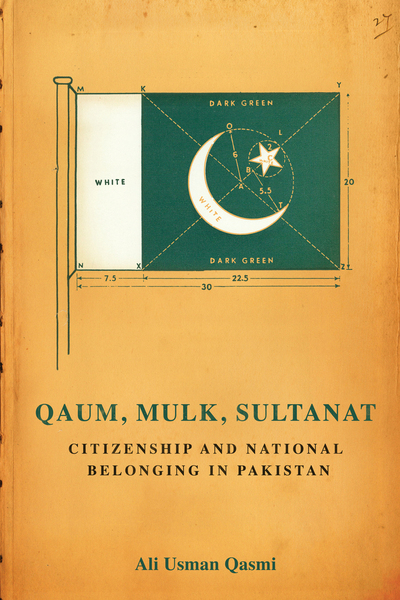
December 2023
444 pages.
from $35.00
Paperback now $17.50 (50% off)
Hardcover ISBN: 9781503637283
Paperback ISBN: 9781503637788
Ebook ISBN: 9781503637795
Winner of the 2024 AIPS Prize, sponsored by the American Institute of Pakistan Studies.
After the trauma of mass violence and massive population movements around the partition of India and Pakistan in 1947, both new nation states faced the enormous challenge of creating new national narratives, symbols, and histories, as well as a new framework for their political life. While leadership in India claimed the anti-colonial movement, Gandhi, and a civilizational legacy in the subcontinent, the new political elite in Pakistan were faced with a more complex task: to carve out a separate and distinct Muslim history and political tradition from a millennium long history of cultural and religious interaction, mixing, and coexistence.
Drawing on a rich archive of diverse sources, Ali Qasmi traces the complex development of ideas of citizenship and national belonging in the postcolonial Muslim state, offering a nuanced and sweeping history of the country's formative period. Qasmi paints a rich picture of the long, arduous, and often conflict-ridden process of writing a democratic constitution of Pakistan, while simultaneously narrating the invention of a range of new rituals of state—such as the exact color of the flag, the precise date of birth of the national poet of Pakistan, and the observation of Eid as a "national festival"—providing an illuminating analysis of the practices of being Pakistani, and a new portrait of Muslim history in the subcontinent.
About the author
Ali Usman Qasmi is Associate Professor of History at Lahore University of Management Sciences.
"Complementing the burgeoning scholarly literature on citizenship, Qasmi's insightful and erudite book foregrounds Pakistan's efforts to frame a conception of citizenship through a range of symbolic trappings of national sovereignty such as the anthem, archives, flag, museums and much more. Based on extensive research in the infamously inaccessible national archives, he demonstrates the myriad contestations that continue to shape conceptions of citizenship in post-colonial Pakistan. Notable in this regard is his revealing study of the reasons for the perennial controversy between the state and the ulema over moon sighting to mark the end of the Muslim month of fasting. A must read for students, scholars and anyone interested in the evolution of citizenship in South Asia, this is an especially welcome addition to the historical scholarship on Pakistan."
—Ayesha Jalal, Tufts University
"Embedding important legal and political decisions about the meaning of sovereignty within the lively debates in civil society that prompted, shaped, and defined them, Qasmi has written one of the liveliest cultural and conceptual histories of Pakistan to date."
—Faisal Devji, University of Oxford
"Combining theory with empirical 'hard evidence', ...Qaum, Mulk, Sultanat represents a veritable game changer in terms of bringing Pakistani developments to bear on wider global theoretical debates, and in the process relocating Pakistan to the heart—rather than languishing on the side-lines—of such discussions."
—Sarah Ansari, Bloomsbury Pakistan
"In a detailed study..., Qasmi excavates previously overlooked legal and religious archives to illustrate how these fundamental issues surfaced in debates over Pakistan's constitutions, the role of the government versus religious authorities in setting the dates of religious holidays, and the country's symbols—the precise shade of green on the nation's flag, the official dress code, the national anthem, and the choice of iconography on official stationery."
—Andrew J. Nathan, Foreign Affairs